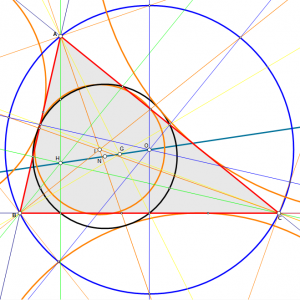So, a little bit of backstory: about 5 years ago, I became very interested in triangle centers for a while, because I thought they were going to solve my problems with the square-peg theorem (they didn’t). Triangle centers are various special points that you can define for a triangle in the plane: say, the center of the inscribed circle, or of the circumscribed circle, or the point where the medians meet. These points are generally all the same for the equilateral triangle, but for an arbitrary triangle they can be quite different. And there are tons of beautiful relations between different centers.
 This picture, from Wikipedia, shows five different centers for an example triangle: notice that four of them are on a straight line. I wanted to run some experiments with them, so I found the coordinates at the comprehensive Encyclopedia of Triangle Centers page. Since the formulas alone weren’t particularly useful to me, I spent a day or two writing a program to auto-translate them into Perl code that I could execute.
This picture, from Wikipedia, shows five different centers for an example triangle: notice that four of them are on a straight line. I wanted to run some experiments with them, so I found the coordinates at the comprehensive Encyclopedia of Triangle Centers page. Since the formulas alone weren’t particularly useful to me, I spent a day or two writing a program to auto-translate them into Perl code that I could execute.
I had found out what I needed to know, and the effort I’d put into it wasn’t particularly novel. But I thought, well, maybe I can save someone else some time. And I packaged the thing up as the Perl Encyclopedia of Triangle Centers, put it on my webpage, and promptly forgot all about it. I think I tracked that there had been a few hundred downloads at one point, but I never got any feedback about it, and I figured that it was probably just one of those many things you do in science which are cool at the time, but don’t particularly go anywhere.
But the other day, I got a pingback for the page, which led me to discover this post, and find out that for at least since 2011, the Perl ETC has been a tiny little part of GeoGebra. Which means that thousands and thousands of people are running, every day, a program with a little bit of my code in it! Which is a pretty good thing to find out on a random Tuesday in the summer. 🙂
The moral of the story, if there is one, is that there are a lot of things that mathematicians produce which can be usefully contributed to the world which are more “research-byproducts” than “research”. So we probably ought to at least think: could this be useful to someone else? Is there an easy, efficient way to package it for distribution? And if so, I encourage you to do it. You never know when something might really catch on!